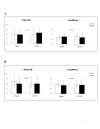Effect of diet and omega-3 fatty acid intervention on asymmetric dimethylarginine
- PMID: 16396682
- PMCID: PMC1343562
- DOI: 10.1186/1743-7075-3-4
Effect of diet and omega-3 fatty acid intervention on asymmetric dimethylarginine
Abstract
Background and aim: Impaired vasodilatation has been suggested to be caused by inhibition of nitric oxide generation by the recently described asymmetric dimethylarginine (ADMA). In the present study we wanted to explore whether n-3 polyunsaturated fatty acid (PUFA) supplementation and/or diet intervention have beneficial influence on endothelial function assessed as plasma levels of ADMA and L-arginine.
Methods: A male population (n = 563, age 70 +/- 6 yrs) with long-standing hyperlipidemia, characterized as high risk individuals in 1970-72, was included, randomly allocated to receive placebo n-3 PUFA capsules (corn oil) and no dietary advice (control group), dietary advice (Mediterranean type), n-3 PUFA capsules, or dietary advice and n-3 PUFA combined and followed for 3 years. Fasting blood samples were drawn at baseline and the end of the study.
Results: Compliance with both intervention regimens were demonstrated by changes in serum fatty acids and by recordings from a food frequency questionnaire. No influence of either regimens on ADMA levels were obtained. However, n-3 PUFA supplementation was accompanied by a significant increase in L-arginine levels, different from the decrease observed in the placebo group (p < 0.05). In individuals with low body mass index (<26 kg/m2), the decrease in L-arginine on placebo was strengthened (p = 0.01), and the L-arginine/ADMA ratio was also significantly reduced (p = 0.04).
Conclusion: In this rather large randomized intervention study, ADMA levels were not influenced by n-3 PUFA supplementation or dietary counselling. n-3 PUFA did, however, counteract the age-related reduction in L-arginine seen on placebo, especially in lean individuals, which might be discussed as an improvement of endothelial function.
Figures

References
-
- Boger RH, Bode-Boger SM, Brandes RP, Phivthong-ngam L, Bohme M, Nafe R, et al. Dietary L-arginine reduces the progression of atherosclerosis in cholesterol-fed rabbits: comparison with lovastatin. Circulation. 1997;96:1282–1290. - PubMed
LinkOut - more resources
Full Text Sources
Other Literature Sources

